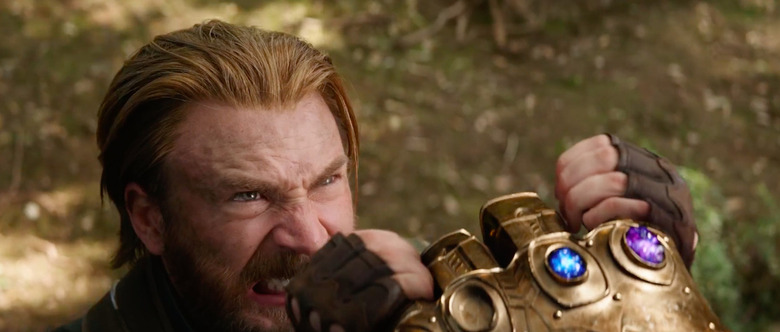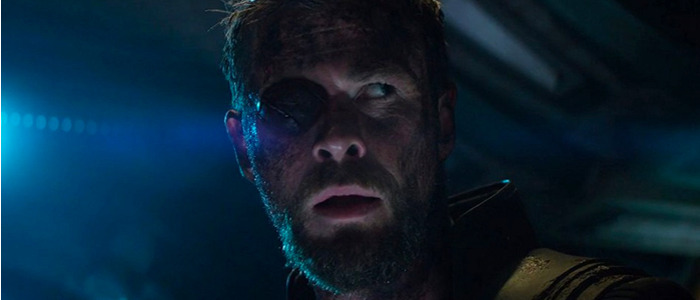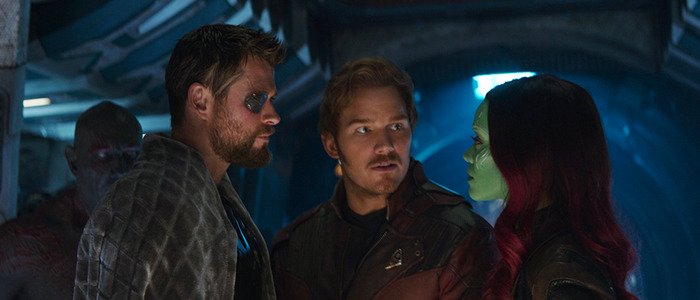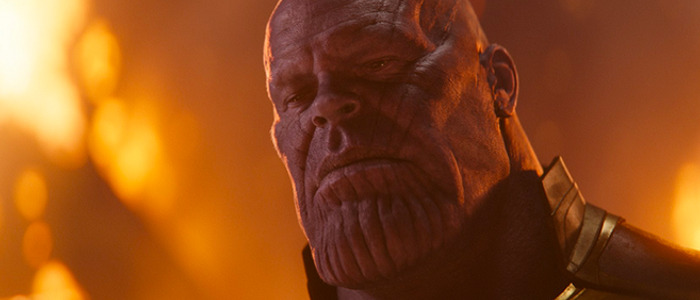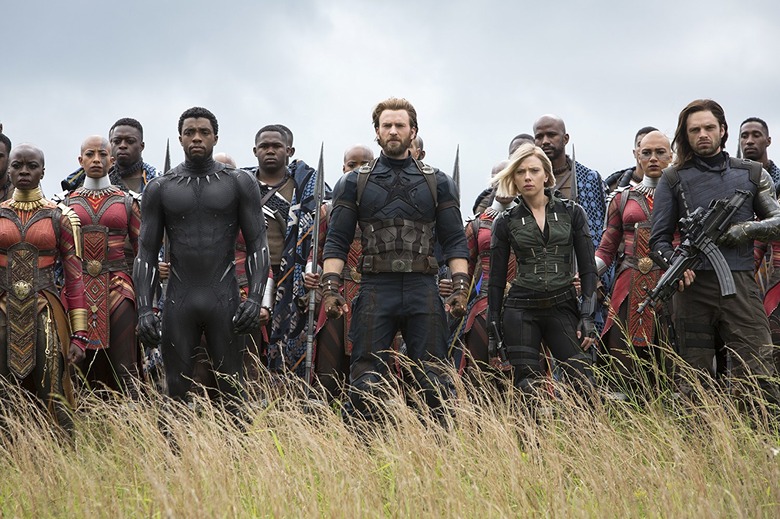Road To Endgame: 'Avengers: Infinity War' Is A Gargantuan Unravelling Of Marvel's Strengths And Flaws
(Welcome to Road to Endgame, where we revisit the first 22 movies of the Marvel Cinematic Universe and ask, "How did we get here?" In Part One of our two-part look at Avengers: Infinity War: how Thanos and the Infinity Stones rewrite our favourite heroes.)Avengers: Infinity War stormed through the 2018 blockbuster landscape, one-upping the industry-wide shift in tone, scale and narrative priorities Marvel had ushered in over a decade. The film combined eight existing franchises to deliver the first half of a humungous finale; the result was on-screen enormity, matched by an inevitable $2 billion box-office haul. The sequel, Avengers: Endgame, is sure to surpass it.The Marvel Cinematic Universe has its roots in military propaganda; the U.S. Department of Defense subsidized (and thus, had screenplay approval over) Iron Man, Iron Man 2, Captain America: The Winter Soldier and Captain Marvel. And though Avengers: Infinity War didn't need to run its script by the Pentagon (as far as we know), it falls back on the series' paradoxical framing of heroism, as a result of its military-funded predecessors. However, this unprecedented crossover event could not have succeeded, or even existed, without a decade of narrative investment. The film takes full advantage of this — albeit to mixed results.For better or worse, Avengers: Infinity War is a culmination of everything the Marvel Cinematic Universe stands for.
Character Un-Development
Avengers: Infinity War occupies a unique space in the Marvel landscape, given its villain Thanos (Josh Brolin), the Mad Titan. Thanos is not the film's protagonist, mind you; this marketing angle is as false as Ant-Man and The Wasp being a romantic comedy or Captain America: The Winter Soldier being a '70s conspiracy thriller. However, Thanos' key function is to impede (and in some cases, undo) the decade-long arcs and storylines of the film's actual protagonists: the Avengers, Black Panther, Doctor Strange, Spider-Man and the Guardians of the Galaxy. Where narrative stakes are concerned, that's a commendable risk.The six Infinity Stones, which have been showing up ever since Captain America: The First Avenger in 2011, help facilitate this function. With near-limitless control over Mind, Soul, Space, Time, Power and Reality — combined, they help Thanos wipe out half the universe — these all-powerful MacGuffins function as metatextual rewrites, as if Thanos' Infinity Gauntlet were reaching into the series from some external realm and undoing its very fabric.Take, for instance, the climactic moment where Wanda Maximoff (Elizabeth Olsen) is forced to kill her lover The Vision (Paul Bettany), whose consciousness resides in the Mind Stone. The couple wrestles with how to control, protect or destroy this power throughout the film, ultimately choosing sacrifice in order to save the universe. And yet Thanos, having just acquired the Time Stone (a time-travel device introduced in Doctor Strange), simply undoes their decision with a flick of his wrist. However, he leaves its harrowing emotional crater intact; Wanda still remembers the pain of killing The Vision, who Thanos then proceeds to murder anyway before taking the Mind Stone.In Avengers: Infinity War, the heroes' sacrifices are for naught, and steps forward for the characters are each cancelled out by intentional steps back.The series has thus far relied on superhero Trolley Problems, each growing in complexity and personal proximity to the heroes. In their debut films, Thor, Captain America, Doctor Strange and the Guardians of the Galaxy chose to sacrifice themselves to save civilians. In The Avengers, Iron Man nearly died while stopping the World Council from killing millions to prevent global invasion. The heroes in Captain America: The Winter Soldier were faced with a similar problem — H.Y.D.R.A., the villains, sought to kill millions to bring about world peace — and in Avengers: Age of Ultron, the Avengers were challenged with a dilemma where failure meant global extinction, but success meant killing an entire city.And while the Avengers had a convenient way out of Ultron's plan (the re-emergence of S.H.I.E.L.D.), they're given no such luxury in Avengers: Infinity War, wherein Thanos' Trolley Problem lays half the universe on one track, and the Avengers' loved ones on the other. In the comics, Thanos kills half of all life to impress the personification of Death. In the films, he's driven by a maniacal, un-feeling utilitarianism; the logical outcome of an MCU where humanist heroes refuse to compromise — until they must.
Thor, God of Nothing
The undoing of developments in prior films begins in the very first scene. The Asgardian refugees — whom Thor (Chris Hemsworth) had saved by destroying his own kingdom in Thor: Ragnarok — are attacked, as is the fate of many refugee ship in the real world. Fun as the film may be in parts, it's not a bright and happy story.The massacre of his brother Loki (Tom Hiddleston), his friend Heimdall (Idris Elba) and half the remaining Asgardians sends Thor tumbling toward regress. His eye-patch was no doubt a cool new look, and one that aligned him with his father's mythical wisdom, but replacing it with a mechanical eye serves a dual purpose. It marks Thor as a victim of Thanos — Gamora (Zoe Saldana), Nebula (Karen Gillan) and Thanos' other children have similar robotic distinctions — and it represents a return to the reckless, pre-Ragnarok Thor, as does acquiring a new hammer.Thor had spent his last five appearances outgrowing his arrogant, vengeful warmongering. Here, he's forced to return to that juvenile state. By the end of the film, he's so hellbent on not just killing Thanos, but looking him in the eye and making him suffer — a revenge mission, rather than an act of universe-saving altruism — that the few seconds between wounding Thanos and potentially killing him are enough to turn the tide.Rather than doing the deed, Thor stops to gloat, and taunts the Mad Titan. During this interval, Thanos snaps his fingers and wipes out half the universe. Thor's moment of catharsis leads to catastrophe.
Guardians of No One
Star-Lord/Peter Quill (Chris Pratt) is forced back into a similar state of arrested development. His first film appearance, Guardians of the Galaxy, was about him learning to accept the pain of grief, and it tied his mother's passing — the rejection of which locked him in perpetual adolescence — to Gamora's love. The Power Stone even conjured his mother's image as he reached out to Gamora, accepting love in the same moment he accepted death. "Take my hand," both women said.In Avengers: Infinity War, Quill's series-long arc culminates when Gamora asks him to kill her, in the hopes of preventing Thanos from finding the Soul Stone. She even makes him swear on his mother to do so. Quill is forced to let go of the love he's been given — not long after losing his father Yondu in Guardians of the Galaxy Vol. 2 — in order to achieve Marvel's brand of heroism: saving people through personal sacrifice.As Quill aims his weapon at Gamora, he cycles through the anger, denial, bargaining and grief of the action he must commit. And just as he begins to accept his mission, Thanos pulls out the rug from under him, using the Reality Stone to turn his gun into bubbles.Quill isn't allowed to mourn. Later in the film, when he discovers Thanos has killed Gamora (while the Avengers attempt to steal the Gauntlet), Quill's return to reckless anger makes him lash out at Thanos and derail the mission. This arc makes for a great narrative catalyst, at least on paper. Though while Quill's emotional bookends work in isolation — accepting Gamora's death, and later failing to do so — the time between these moments fails to dramatize Quill's emotional journey. In the interim, he's back to making jokes and arrogant quips.In contrast, Thor's grief is a focal point whenever he's on screen. It's why his arrival in Wakanda feels so viscerally rousing; he earns his place in the battle, and his opportunity at revenge. Quill's screw-up, however, doesn't feel tethered to the emotions driving him. He acts recklessly on Titan, but his narrative until then never externalizes the source of his regress: a deep-seated pain, as he's prevented from accepting death once more (Dramatic stakes becoming apparent only in-the-moment is one of the film's most common problems).Gamora, too, is forced into a premature culmination; her story is essentially over when she believes she's killed Thanos. She's forced to reckon with the pain of having murdered her own father, but this turns out to be another Reality Stone ruse. Even when Gamora tries to kill herself to prevent Thanos from acquiring the Soul Stone, the Mad Titan doesn't permit her this sacrifice. He replaces her knife with bubbles as well, and takes her life instead.This thematic through-line — sacrifice, what it means, and who gets to do it — is best embodied by Captain America (Chris Evans), whose brief presence speaks volumes about the series thus far. Though, the idea of sacrifice is also contorted and corrupted by the Mad Titan, making him the Avengers' twisted reflection.
Framing Thanos
Avengers: Infinity War is a structural oddity. In the process of balancing dozens of characters, some, like Steve Rogers/Captain America, get the short end of the stick. Rogers doesn't show up until 40 minutes in, and there's little clarity as to what he, the Falcon (Anthony Mackie) and Black Widow (Scarlett Johansson) have even been doing these last few years. We're yet to see any real emotional fallout from Captain America: Civil War, and there's a good half hour of the film during which Rogers & co. don't re-appear at all.And yet, Rogers' presence here is thematically vital — especially to Thanos, despite the two barely colliding. While discussing whether or not The Vision should sacrifice himself, Rogers vocalizes the team's (and thus, the film's) mission statement, even in the face of extinction: "We don't trade lives."This uncompromising through-line has, thus far, been the Avengers' core. But it's a belief they're finally forced to go back on thanks to Thanos, that too in ways that don't afford them an equivalent payoff. They do finally trade lives, but they lose regardless. In fact, Thanos' readiness to trade lives, in contrast to the Avengers', is what makes him their perfect foil. Though Captain America sticking to his guns is a source of little conflict; the Avengers eventually trading lives is something he never challenges, nor something that challenges him, since these decisions are made when he isn't around. One wonders what might have been, had Rogers and Thanos been allowed to exchange words and perspectives, rather than punches.Thanos' plan involves wiping out half of all life (all sentient life, one assumes), thus enacting a Neo-Malthusian population control, taken to the extreme. To do this, Thanos must first sacrifice that which he loves most — his daughter Gamora — in order to attain the Soul Stone. "A soul for a soul," he's told by the Stone's keepr (a returning Red Skull), though the soul Thanos sacrifices here is implicitly his own.(This is also the only time in the series other than Doctor Strange where an Infinity Stones feels thematically tied to character.)Whether or not Thanos' scheme will technically work (there are numerous logistical arguments against it; I would argue it doesn't matter), his willingness to detach himself from empathy is what separates him from the Avengers. Where Ultron had no empathy to begin with, Thanos actively battles his more humane impulses, in order to act in a manner he calls heroic.He forces the Avengers to do the same.Like Killmonger before him, the abstract extremes of Thanos are a perfect fit for the story. Though there's an unevenness to his philosophy that doesn't quite work in the context of his literal actions. He believes in achieving universal balance at a 50/50 rate, but who he kills, and when, and why, don't seem to align. For instance, he murders 300 dwarves on Nidavellir and leaves only Eitri (Peter Dinklage), which raises questions about his dedication to his own objective. The film never dramatizes or even mentions this contradiction.Though, one might argue that 300 is a mere statistical glitch in the grand scheme of his plan; a "necessary" cruelty. As benevolent as Thanos thinks he is, he cuts off Eitri's hands to ensure no other Infinity Gauntlets are made, evoking the widely-told myth about Mughal ruler Shah Jahan who, after construction of the Taj Mahal in the 1600s, was said to have amputated the hands of 20,000 labourers who built it. (The reality was likely a simple understanding that they wouldn't work for other emperors, but the barbarous folktale makes for a more sensational, more egomaniacal story).In fleshing out Thanos' methods, the film has ample opportunity to use the limitless visual potential of the Infinity Stones, but it often flubs this as well. The abilities and limitations of each Stone are ill-defined, as is which one is being used in a given moment (unless you like to pause the film and make colour-coded charts). This leads to confused action beats where the drama is unclear.When Thanos is first attacked by the Guardians, he dices Drax (Dave Bautista) and mangles Mantis (Pom Klementieff), reducing them to dozens of pieces. These moments seem horrifying; for the first time in the series, we witness heroes be physically butchered! Though rather than clarifying the effects of the Reality Stone or how Thanos choses to wield it, the film leaves us to discover that Drax and Mantis are safe and sound, but not until after major story beats involving Quill and GamoraIn a given scene, there's little delineating who Thanos would or would not kill using these lethal, all-powerful Stones. Certain characters understandably must be kept alive for the climax, but the dramatic stakes in the interim lack a sense of precision for a villain so otherwise precise. That said, from the moment Thanos is introduced, he comes off as formidable. He goes toe-to-toe with the Hulk (Mark Ruffalo) in an exchange of punches — a grounded, un-fantastical introduction that helps establish Thanos' physical might — and he defeats the Hulk with ease. This sparks Bruce Banner's own character regression wherein, after finally accepting the Hulk in Thor: Ragnarok, he can no longer summon his big green friend.Though once Banner arrives on Earth, his scenes whizz by in a manner that prevents any serious reflection. The downside to Thanos existing to undo character arcs is that sometimes, the drama feels clunkily and artificially delayed. Banner's arc, for instance, is left incomplete. There's little payoff to him being unable to summon the Hulk beyond comedy, and he barely exchanges two words with Natasha Romanoff, the woman he was in love with when he departed Earth in Avengers: Age of Ultron.When the Hulk arrived in New York in The Avengers, it was so his story could culminate through action. When he and the others arrive in Wakanda in Avengers: Infinity War, most of their stories are in stasis, and they remain this way throughout the final battle.
The Forgotten World of Wakanda
In some cases, it's forward momentum, not backward, seeing the characters through. Though, given Thanos' apparent function in the shared-universe context — he challenges character arcs by un-writing them — it's hard to say whether the occasional straightforward approach works best for the overall narrative.T'Challa's (Chadwick Boseman) decision to aid the Avengers is a direct result of Black Panther, and the logical outcome of an arc that made him open Wakanda to the world. Though unlike several other Avengers, there's nothing in the film — neither Stone-related, Thanos-related, nor otherwise — that challenges T'Challa's moral outlook. In a story where so many Avengers are pushed to their limit (even Falcon and Black Widow return to assist their persecutors), T'Challa feels like an afterthought.Wakanda itself feels narratively incidental to Avengers: Infinity War. T'Challa and his kingdom don't show up until an hour in, and the film, as if wobbling under its own weight, continues introducing previously important characters like Shuri (Letitia Wright) and M'baku (Winston Duke) well past the 90-minute mark.T'Challa, Okoye (Danai Gurira) and the other Wakandans disappear for large chunks of the movie, and they don't return until it's time for the fighting to ensue. The edit favouring the other characters isn't inherently an issue, but the Wakandan part of the story is relegated to an enormous stand-off, which exists primarily to wheel-spin. It delays dramatic conflicts in a way that, once more, centers Marvel's signature pre-visualized, CGI-heavy action divorced from story and character.Of all the action in the film — and there is plenty — the Wakanda battle is the least visually or narratively engaging.
***
In Part 2, we look at the film's massive action scenes, the Black Order, the New York Avengers (Iron Man, Doctor Strange and Spider-Man), all those deaths, and what's truly at stake in Avengers: Endgame.

